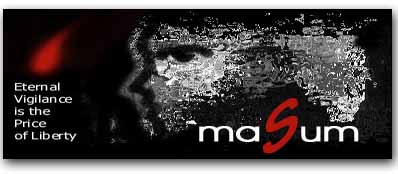
|
Developing a broad based HR movement. Investigation in the cases of abuses of human rights Legal intervention in specific cases Searching new avenues in awareness campaign Documentation & Publication |
MASUM wants to bring back the spirit of exploring the different dimensions of human rights, to provide a forum for dialogues on different aspects of HR movement. a MASUM is therefore an organisation of any activists of the HR movement who shares these thoughts and works for that. MASUM has no new manifesto, no ideological hang-ups. It sees itself as an agent to spread HR movement on its own strength supplementing the initiatives of existing HR groups. It wants to continue uncompromising fight against all forms of human rights violation.
Based on a loose organisational structure, devoid of any structural hierarchy MASUM has no formal membership. It depends solely on a meager fund constituted out of donations and contributions from its activists. MASUM's aims include: Developing a broad based HR movement. Investigation in the cases of abuses of human rights Legal intervention in specific cases Searching new avenues in awareness campaign Documentation & Publication
| Mission to end custodial Torture... |
MASUM took the issue of torture as a primary concern and started its intervention to curb the rising custodial violence. On 4th August, 1998, they filed an application under article 215 of the Constitution of India along with Contempt of Court Act against concerned state-authorities for non-compliance of Supreme court's 11 point directives to comply certain formalities before arresting any person and issuance of Memo of Arrest. They cited around 50 cases where no memo of arrest was served and informed the court that the Supreme Court's order dated 18 December, 1996, in general, not obeyed by any branch of police force. This includes Calcutta police, State police, Railway Police, CBI etc. The petition made 95 officials including Chief Secretary to the Govt., Commissioner of Police, IGs, DIGs, and SPs of different police administrations as respondent to the case. Consequent to the petition MASUM organised campaign in various forms. As a result a number of intellectuals, human rights activists and others signed an appeal to support their call for implementation of Supreme Court's order. If MASUM succeeds, it will be a big leap towards resisting custodial violence.
| MASUM Felicitates -->>>>>> |
| Searching New Avenues |
Organisation of three consecutive Human Rights Fair at the open space of College Square, MASUM has also carved a niche in the local cultural scenario of Calcutta and has proved itself as a novel idea for awareness campaign for human rights. Held annually, for 3-4 days taking 10th December, the human rights day in between it has become a good exhibition of rare documents-books-posters-paintings on human rights, women issues, child rights, environment as well as health issues. The fair also includes recitations, songs and dramas on social concern and issues. As a part of the programme MASUM also felicitates individuals for their achievements in and concerns towards the issues of human rights. The previous recipients are:
- 1998 Sri Biren Roy, Human rights activist and Trade Unionist and Sri Tapan Sinha, noted Filmmaker with human concern.
- 1999 Smt. Tilottama Bhattacherjee, Human Rights & Cultural Activist.
- 2000 Sri Niranjan Halder, Human Rights Activist & Journalist.